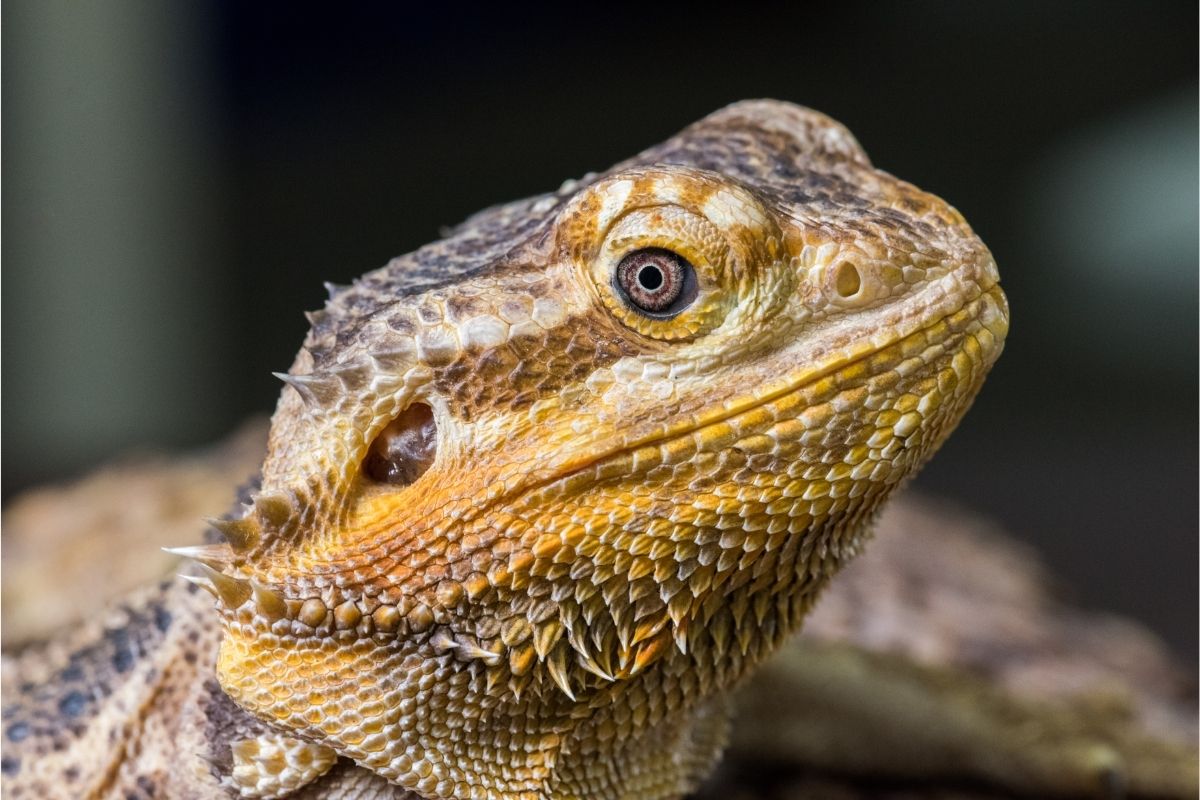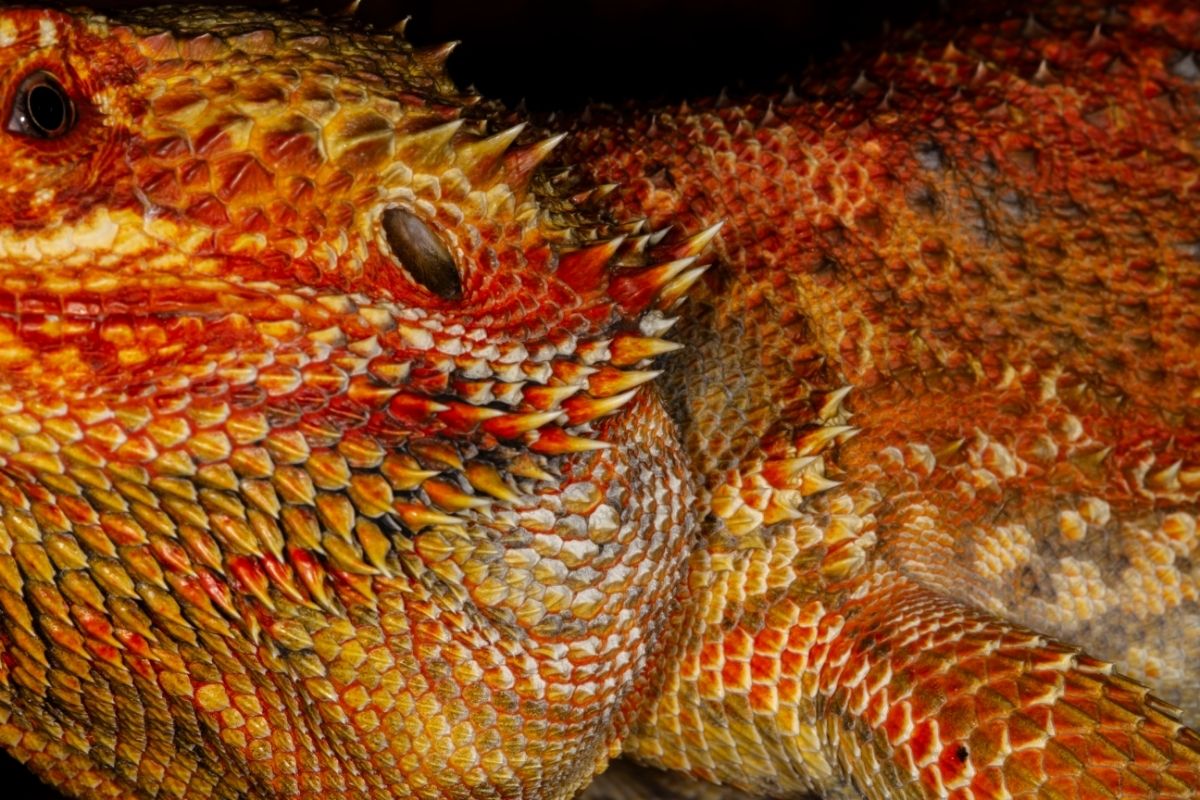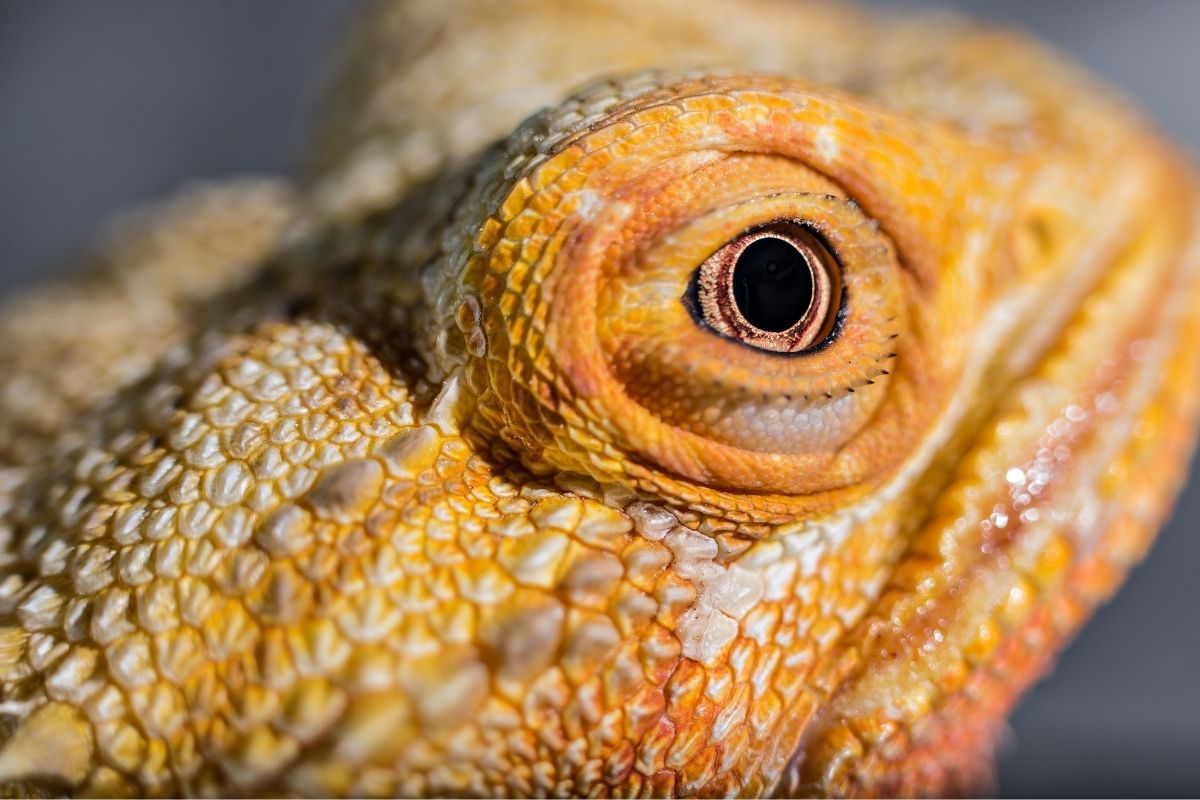Bearded dragons are reptiles native to Australia. They are known for having large heads and bulging eyes.
Bearded dragons are carnivorous lizards, meaning they eat meat. Their diet consists mainly of insects, spiders, worms, and other invertebrates.

In terms of pets, bearded dragons are quite unique. The beards on their faces give them a very distinctive appearance.
It is from this aesthetic marker that they get their name. This is why many people choose to keep these animals as pets.
However, because they are unique animals, bearded dragons sometimes behave quite weirdly.
For example, they may bite or even try to attack the owner when they see them. In addition, they can also have trouble breathing in certain situations.
Another odd behavioral trait is that they occasionally have bulged eyes. When this happens, your first response may be to panic.
However, it is important to remember that this behavior is not always alarming.
There are several reasons why bearded dragons might have bulging eyes. Here are some of the main causes.
What Causes Eyes Bulges?
Increased Blood Pressure
When blood pressure increases, the eyeballs will swell up.
If you notice that your bearded dragon has swollen eyes, then this could mean that they are experiencing an increase in blood pressure.
This will be especially true if your pet seemingly has bulged eyes all the time. You should take them to the vet immediately if you suspect this.
This is because high blood pressure can cause serious health problems.
To prevent these health problems from occurring, the vet may be able to advise lifestyle changes.
These changes may include reducing stress levels, getting more exercise, and eating healthier foods.
Alternatively, your bearded dragon may be intentionally altering its blood pressure. This would allow them to look bigger than they actually are.
Some lizards have the ability to regulate their blood pressure.
While it remains unconfirmed if bearded dragons possess this skill, some scientists have theorized.
Vitamin Deficiency
If your bearded dragon has been missing out on vitamin supplements, then this could be the reason why they have bulging eyes.
Vitamin deficiency causes swelling in the body. Since the eyes are part of the body, they can swell too.
To prevent this problem from happening, you may need to alter the diet of your bearded dragon. They should receive vitamins daily.
If you do not provide enough vitamins, then your lizard’s eyes may become enlarged.
This is why it is so important to ensure that your bearded dragon receives proper nutrition.
Though they like eating mice and other rodents, the majority of their diet should be formed by insects and leafy greens.
Insects are rich in protein, copper, and phosphorus. Some of the insects that you can provide include crickets, locusts, grasshoppers, and mealworms.
Leafy greens such as kale, spinach, and lettuce are excellent sources of iron and calcium. For these foods, bearded dragons can receive all the required vitamins.
You can also provide them with occasional pieces of fruit if you want to boost their nutrients.
Bear in mind that fruits should not be given to this exotic reptile too often. Otherwise, they may develop a taste for them.
Fruits are high in sugar, which will not be overly beneficial for these creatures.
If you are unsure of what food you should be giving your pet, feel free to consult a reptile vet.
They can perform a blood test to see if there are any problems with your pet’s diet.
Infection
A third possible reason for bulging eyes is infection. Eye infections are pretty common among bearded dragons.
In fact, they are one of the most common eye conditions that lizards experience.
The symptoms of an eye infection include redness around the eyes, discharge, and pain. Furthermore, their eyes could be swollen or crusted.
Your bearded dragon may have developed an eye infection due to a fungal or bacterial infection. Another cause could be mites.
Mites are tiny parasites that live on the skin of reptiles. They can cause irritation and inflammation. If left untreated, they can lead to severe infections.
Finally, this infection could be caused by the use of inappropriate material in the cage or enclosure.
It is very important to treat any eye infection as soon as possible. This is because untreated eye infections can lead to blindness.
Therefore, you should seek immediate medical attention if you notice any signs of an eye infection.
If your lizard does not seem to respond well to treatment, then you should consider taking them to a veterinarian.
These infections can be treated simply with eye drops. These can be given to you by a vet.
However, if you are unable to see a vet immediately, you can try washing your bearded dragon in a hot bath.
Putting a few drops of water around the eye can clean the infected area.
Shedding Process

An alternative reason for this occurring is the shedding process. When your bearded dragon sheds its scales, it will usually rub off some scales.
To make this process easier, it is believed that the eye bulges so that the skin is not as tight.
Shedding is a perfectly natural process that a lot of lizards undergo. It helps them shed dead cells from the body.
You can help your bearded dragon shed more easily by providing them with a good quality substrate.
A substrate is something that provides support for the animal’s weight.
Bearded dragon owners can also speed up the shedding process by washing them in warm water.
To prevent improper shedding, you can also alter the enclosure’s humidity.
Too Much Vitamin A
Another reason why your bearded dragon has bulged eyes is excessive vitamin A intake. Too much vitamin A can result in problems like liver damage.
As a result, your lizard may become lethargic, lose appetite, and develop a swollen eye.
If you suspect that your bearded dragon has been fed too much vitamin A, then you should consult your vet.
They can advise you on how to handle this situation.
Alternatively, you can simply try changing the diet of this reptile. Some of the foods that are high in vitamin A are carrots, sweet potatoes, and squash.
If you think that your reptile is consuming too much vitamin A, you might want to avoid these foods for a while.
There are plenty of other vegetables that you can feed them instead.
Improper Substrate
An unsuitable substrate is another factor that can contribute to the development of this condition.
An incorrect type of substrate can affect the health of your bearded dragon. For example, sand can sometimes dry out their skin.
In addition, wood shavings can irritate the skin. These foreign objects could irritate the eye, causing it to become swollen.
Metal is known to be one of the worst substrates for bearded dragons.
Therefore, you should select a substrate that is acceptable for your dragon.
The right kind of substrate will provide support for your animal’s weight without being harmful.
These substrates can be purchased online or in pet stores, whichever is more convenient for you.
For example, you can purchase reptile carpet, bark, or sand for bearded reptile enclosures. Some people even use newspapers, which is a great way of recycling old paper.
You can also use a substrate that is easy to clean. It would be best if you were able to wash the substrate regularly.
This will limit the risk of infection significantly.
If you believe that the type of substrate that you are currently using is causing this bulging, you may want to experiment with a different variety.
Luckily, there are lots of different substrates that you can experiment with. If one doesn’t work, you can simply try another.
Inadequate Water
Your bearded dragon needs adequate amounts of water to stay healthy. If they do not receive enough water, then they will dehydrate.
This dehydration can lead to health problems, such as an enlarged eye.
You can check whether your bearded dragon has sufficient access to water. You can measure the amount of water that they drink each day.
However, keep in mind that reptiles need very little water. Bearded dragons are native to dry deserts, where they receive very little water.
Most of the water in their diet comes from the food that they eat.
If you notice that your bearded dragon is drinking less than normal, then you should increase its water supply. You can add some fresh water to their enclosure.
Alternatively, you can buy bottled water for your animal. You can also use a water dispenser, allowing the animal to access moisture whenever required.
Remember to only give them small amounts of water at a time. If you put too much liquid in the water bowl, you may end up wasting water.
If your dragon doesn’t drink much water, this is fairly normal behavior. However, if they don’t drink any, your reptile will suffer from prolonged dehydration.
What Do Eye Bulges Look Like?

An eye bulge looks like swelling around the eyes. There are two types of eye bulges: external and internal.
External bulges occur when the eyelid is pulled away from the eye. Internal bulges happen when the eyeball expands.
External bulges are usually harmless. They tend to go away after several days. However, if they persist, you should consult your veterinarian.
Your vet will prescribe medication to treat this problem.
Internal bulges are more serious. They could indicate an underlying medical condition. In most cases, these bulges disappear within a few weeks.
However, if they continue to grow, then you should take your animal to your vet immediately.
If your dragon has an eye that looks swollen and they are finding it difficult to see, this is likely an eye bulge.
You must get this checked out by a professional before it gets worse.
Do Baby Dragons Also Get Eye Bulges?
Baby bearded dragons often have bulging eyes. The causes of this condition are often the same as adult dragons.
In fact, the age of the animal will not affect its ability to receive eye bulges.
However, baby dragons are prone to getting eye infections. These infections are caused by bacteria.
Some of the bacteria that cause eye infections are found in dust mites. Dust mites live on the skin of your bearded dragon.
If you notice any signs of infection, you should get the baby bearded reptile checked as soon as possible.
As with adult dragons, a swollen eye could merely be part of their behavior.
For example, they could be shedding their outer skin. They normally begin this process once they are 6 months old.
This is why it’s important that you monitor your baby bearded dragon closely.
Normally, a bulged eye is only cause for concern if it has been there for a while or if it is accompanied by other symptoms, such as loss of appetite.
Frequently Asked Questions
Do Bearded Dragons Have Eye Issues?
Yes, bearded dragons have eye issues. They often suffer from eye infections and swollen eyes.
Sometimes, the problem is caused by bacteria, fungi, or parasites. Other times, it is due to improper nutrition.
How Can I Prevent My Bearded Dragon From Having Swollen Eyes?
You can prevent your bearded dragon from having swollen eyes in several ways.
First, you must ensure that your animal receives proper nutrition. Your bearded dragon requires specific nutrients to maintain good health.
Therefore, you should make sure that you feed your animal a well-balanced diet.
Second, you should regularly monitor your animal’s living conditions. Make sure that they have adequate space and ventilation.
Also, make sure that they have access to plenty of light.
Third, you should avoid giving your bearded dragon any medications unless you are certain about what they contain.
Communicate with your vet before applying for any medicine.
Can I Use A Substrate That Is Easy To Clean?
A substrate that is easy to wash is important. You should always wash your bearded dragon’s enclosure thoroughly on a regular basis.
Otherwise, you may introduce new germs into the area.
It would be best if you could find a substrate that does not require cleaning or that can be replaced easily. For instance, newspapers are easy to change.
Final Thoughts
Overall, eye bulges are fairly common among bearded dragons. They usually appear during times when the animals are stressed or ill.
Therefore, you should take extra care of your bearded dragon when they are experiencing stress.
This includes providing proper nutrition, adequate water, and appropriate housing conditions.
If your bearded dragon suffers from an eye bulge, you may need to make some changes to improve its lifestyle.
With our help, you can ensure the dragon gets the treatment it requires.
